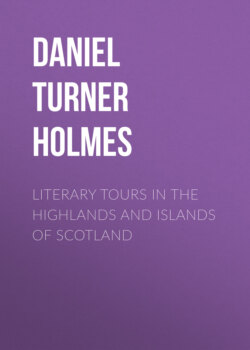Читать книгу Literary Tours in The Highlands and Islands of Scotland - Daniel Turner Holmes - Страница 8
На сайте Литреса книга снята с продажи.
LITERARY SOCIETIES IN THE HIGHLANDS.
ОглавлениеTable of Contents
Winter with its long nights gives leisure to the remote glensmen and crofters. The distractions of the town are not there to take their minds away from study and meditation. Books may not be abundant, but what literature is available is eagerly fastened on and thoroughly digested. In the Lowlands we skip over our books and know nothing thoroughly. The Highlander, with his limited means and choice, is forced to peruse and re-peruse, even though he has nothing more lively than Boston's Fourfold State, or Hervey's Meditations among the Tombs. But he knows well what he has so often read, and is quite competent to discuss and criticise his little row of volumes. A few of the Highland townships have literary societies in which every variety of subject is debated: the meetings are usually opened with prayer, but not always closed in that way. There is a tiny clachan, some twenty miles distant from Ullapool, on the side of a hill, in view of the grotesque peaks of Suilven, which has a most flourishing literary society—with president, vice-president, rules, minutes, and committees. Not once, but twice a week does this society meet, and when the full moon is propitious for a clear journey home through the morasses, the debates are often unduly prolonged and the chairman's summing-up luxuriantly prolix. How many politicians of note in London have been raked fore and aft in that little schoolroom! What measures and enactments, plausible to the unthinking metropolitans, have been cut and slashed there, while the conscious moon, gleaming in at the window, strove vainly to disperse the loquacious throng! Listen to the chairman's modest remarks: "I do not wish," he says, "to embarrass the Government, but. …" Unthinking Asquith, here is a man who does not wish to embarrass you; he could do it, but he is merciful! You may breathe freely, you and your Cabinet, for spite of your slips and blunders, the Ross-shire crofters will not turn round and rend you. They do not wish to embarrass the Government; but have a care: their eyes are on you, and forbearance has its limits. Think not because they live remote from train and telegraph, that you are immune from their censure. Far from it! Round the hill-side at a stated hour every day, in shine or shower, gust or calm, comes the mail-coach of King Edward VII., bringing its pile of letters and newspapers. I see the little throng of village politicians, eager-eyed, peruse the latest parliamentary news. There they get all the needed pabulum for the next political debate. If the answers to Mr. Galloway Weir have been shifty and evasive, it will go hard with the Government to-night in the little schoolroom, and the plaster will fall in showers of dust from the ceiling as the iniquities of our rulers are ruthlessly shown up. I should not like to feel the rough side of that chairman's tongue.
A library of representative English works, presented to a remote provincial society like the one I speak of, is a centre of unspeakable entertainment and instruction. The entertainment, during the long nights of winter, when the natives gather round the ingle and someone reads aloud, is a very palpable addition to the joys of life. The instruction is perhaps slower in coming, but is none the less sure. Only by comparison of books can their relative value as literature be determined. Bigotry and narrow-mindedness in literature and religion are almost always the result of ignorance. In the Highlands it is oftenest the local teacher who is the librarian, and the books are accommodated in the school. The teacher is thus able to make his instruction in literature vivid and interesting to his senior pupils; he can authorise a pupil to take a particular volume home and require an essay to be written on it within a given time; and he can, in school, read aloud typical passages of good prose to supplement the limited extracts of the class text-books. The books have been selected (i.) to form useful reading for adults; (ii.) to supply suitable pabulum for literary societies; (iii.) to aid the schemes of the Education Department in connection with what is called the "Supplementary Course of Instruction in English Literature." The selection of the books for the use of senior scholars has been, as a rule, easy enough. Dictionaries of the French and German languages, good atlases, and works of reference have, in most cases been included.[1]
